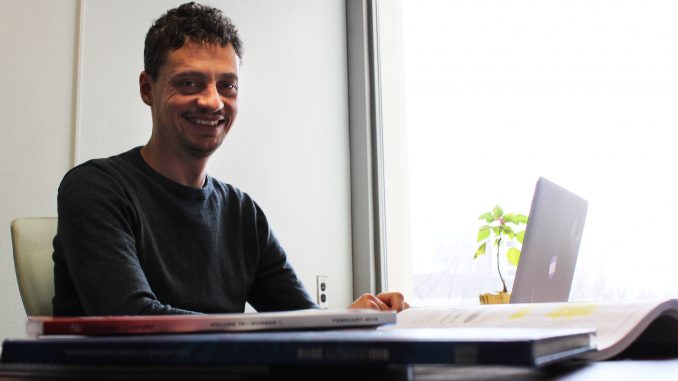
Victor Gutierrez-Velez developed a deep connection to the natural world in Medellín, Colombia, where he often swam and camped as a child growing up.
Now, as a scientist and academic, he wants to help preserve the nature of Colombia that he enjoyed as a child.
“I saw that, as I was getting older, and I went back to these places, the water would start to smell bad and I couldn’t swim there,” he said. “Beautiful forests didn’t exist anymore.”
Gutierrez-Velez, a geography and urban studies professor, is the principal investigator in a project to help the Colombian government make decisions that protect the country’s biodiversity and ecosystems. With the help of a $600,000 NASA grant, Gutierrez-Velez and his colleagues want to create a platform where policymakers can ask questions and scientists can provide needed information in digestible and valuable ways.
Biodiversity is how plants, animals, fungi and lichens — a composite organism made up of algae and fungi — are structured and function in a system. Colombia makes up less than one percent of the land on Earth, but it hosts 10 percent of all known species on the planet. This richness in species is what makes Colombia a megadiverse country, according to the journal, Environmental Science & Policy.
Gutierrez-Velez’s proposed support system would take remote sensing data collected from satellites — which show processes happening on Earth, like urban expansion, deforestation and agriculture — and share that information with policymakers so they can easily understand it when making decisions that may affect the biodiversity and ecosystems in the country.
Currently, the Colombian government does not have the technical expertise to be able to download, process and analyze the satellite information, so they often make decisions blindly, Gutierrez-Velez said.
Collaborators, mainly from the Humboldt Institute and the Max Planck Institute for Biogeochemistry in Germany, came together with Gutierrez-Velez in 2016 through an initiative called PEACE, or Platform for Ecological Analysis in Colombia and its Ecosystems.
After PEACE’s first meeting in 2016, NASA released a call for proposals that fit PEACE’s purposes and priorities. Gutierrez-Velez and his colleagues wrote a proposal, which was accepted.
Gutierrez-Velez said the government needs to make decisions about where to grow food, which areas need to be protected and how to combat sustainability challenges like deforestation. The right decisions could also result in the conservation of certain species and ecosystems.
“Our mission is to do research on biological resources in Colombia, but that research needs to be applied for political decisions for the management of Colombian biodiversity,” said Maria Cecilia Londoño, a researcher at the Humboldt Institute. “So it’s not just any type of research, but very focused on applied research.”
The Humboldt Institute evaluates Colombia’s biodiversity and uses the information to help policymakers make sustainable decisions about the environment. This organization is using the NASA grant with Gutierrez-Velez.
Before he came to the United States, he graduated with a degree in forestry from The National University of Colombia in 2000. When he was considering where to go for his graduate studies, he wanted international experience and to expand his understanding of the world.
In 2006, Gutierrez-Velez moved to the U.S. to get his master’s in geography from Clark University in Massachusetts. He then earned his Ph.D. in ecology, evolution and environmental biology from Columbia University in 2013.
“My expectation was to be able to help my country overcome many problems that it was going through at the time I came here, most of them related to violence,” he said.
Gutierrez-Velez said Colombia has become less violent since peace talks began between President Juan Manuel Santos’ government and the Revolutionary Armed Forces of Colombia — People’s Army began in 2012. Scientists, like him, were then able to make efforts to manage the high biodiversity in the country.
“Where people are mining, a lot of the mining is illegal, so the practices are very poorly considering the environment,” Gutierrez-Velez said. “Now that these areas that were under the influence of violence are under more stable social conditions, they are starting to suffer a spike in deforestation rates because of colonization and economic expectations.”
Gutierrez-Velez said the two biggest environmental concerns in Colombia are the effects of mining and deforestation. The impact of these practices could be identified earlier with the satellite information so preventative decisions could be made before mining and deforestation cause damage beyond repair.
Gutierrez-Velez believes that one of the biggest challenges in sustainability efforts is bridging science with decision-making.
“I hope that that bridge will become stronger and hopefully science and decisions will be blended so that everyone is working toward solving those critical problems that are not only happening in Colombia, but in different parts of the world,” Gutierrez-Velez said.


Be the first to comment